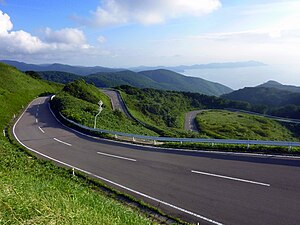Nakadomari, Aomori
|
Nakadomari 中泊町 |
|||
|---|---|---|---|
| Town | |||

Tatsudomari Line between Kodomari and Cape Tappi
|
|||
|
|||
 Location of Nakadomari in Aomori Prefecture |
|||
| Coordinates: 40°58′N 140°26′E / 40.967°N 140.433°ECoordinates: 40°58′N 140°26′E / 40.967°N 140.433°E | |||
| Country | Japan | ||
| Region | Tōhoku | ||
| Prefecture | Aomori | ||
| District | Kitatsugaru | ||
| Area | |||
| • Total | 216.33 km2 (83.53 sq mi) | ||
| Population (October 2016) | |||
| • Total | 10,905 | ||
| • Density | 50/km2 (130/sq mi) | ||
| Time zone | Japan Standard Time (UTC+9) | ||
| Symbols | |||
| • Tree | Hiba | ||
| • Flower | Chrysanthemum | ||
| • Bird | Barn swallow | ||
| Phone number | 0173-57-2111 | ||
| Address |
434 Kameyama, Nakasato, Nakadomari-machi Kitatsugraru-gun, Aomori-ken 037-0392 |
||
| Website | Nakadomari Town HP | ||
Nakadomari (中泊町 Nakadomari-machi?) is a town located in Kitatsugaru District of northeastern Aomori Prefecture in the Tōhoku region of Japan. As of October 2016, the town had an estimated population of 10,905 and a population density of 50 persons per km2. Its total area was 216.3 km2.
Nakadomari consists of two discontinuous areas on Tsugaru Peninsula, one area on the northwest coast facing the Sea of Japan and the other area inland in the center of the peninsula.
The town, like much of western Tohoku, has a cold maritime climate characterized by short summers and long cold winters with heavy snowfall. Snowfall typically begins in late November and lasts through March and sometimes April. Blizzard-like conditions, created by strong winds and a heavy accumulation of snow, are common during winter. During these times visibility can be reduced to several feet or less.
Nakadomari has several yearly festivals including a firefly festival, summer festival and winter snow festival. They are known locally for producing high quality blueberries and dried squid.
Nakadomari was created on March 28, 2005 as a result of the merger of the town of Nakasato and the village of Kodomari, both from Kitatsugaru District.
The economy of Nakadomari is heavily dependent on agriculture and commercial fishing.
...
Wikipedia



